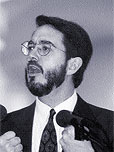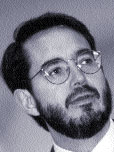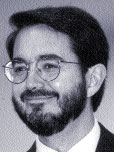|
|
Scott Hahn: “I would say to cradle Catholics, thanks for holding down the
fort, thanks for keeping that fire lit.” Catholic New World photos/ David V. Kamba
Theologian finds ‘family’ in Catholic Church
|
|
|
|
|
|
THE INTERVIEW a regular feature of The Catholic New World, is an in-depth conversation
with a person whose words, actions or ideas affect today’s Catholic.
It may be affirming of faith or confrontational. But it will always
be stimulating.
|
|
Catholic New World staff writer Michelle Martin talks with Scott Hahn.
Scott Hahn, 44, became a Catholic in 1986. Before that, he was
an ordained Presbyterian minister with 10 years in ministry experience.
Since then, he has made his mark as a prolific author and speaker.
He now serves as a professor of theology and Scripture at Franciscan
University in Steubenville, Ohio, where he is also the founder
and director of the Institute of Applied Biblical Studies. He
and his wife, Kimberly, have six children. He was in Chicago Feb.
23 speaking on “First Comes Love: Finding Your Family in the Trinity,”
part of St. Thomas of Canterbury’s Lenten lecture series on “The
Sacramentality of Sex.”
The Catholic New World: I read a lot of your personal history
about why you decided to become Catholic; how has your appreciation
of the Catholic Church changed since you’ve been Catholic?
Scott Hahn: I would say it’s more of the same. I remember Cardinal Newman
being asked if he had any regrets. Essentially, I would say the
same as he said, and that was, I only wish I’d come in sooner,
and I only wish I could internalize it more deeply.
Once you have a sense of homecoming, then all you want is more
of what you’ve found. I think there’s also an appreciation on
my part of, since I’ve been a father, how much my own family depends
upon the “familia Dei,” the family of God. It’s not only what
made sense of the church for me, having a family, but it’s also
what makes family life the joy—and the struggle—but something
that works in a way that it would never work if you were on your
own.
TCNW: Today you were talking about finding your family in the
Trinity, the model of the divine family. How has that changed
the way you see your family?
SH: As drastically as any discovery I could ever make. It’s hard
to even describe without getting emotional. It’s where the head
and the heart are fused. In some ways, I would say, people like
me who grew up in a family like mine—it was good enough, but we
weren’t close and we weren’t religious. We did a little bit of
church stuff as Protestants but not much. We were kind of a broken
family, and I helped to break it. Whereas my wife’s family was
really strong and still is.
I found this incredible hope that people like me who come from
a family that’s breaking often are led to discover why God allowed
that. I had this deep need for family that my wife never had.
So it was like a rubber band: when you pull in the wrong direction,
and you finally let go, you can fly farther and faster than people
who were content with whatever home life they had. It took her
a while for the Catholic faith to really scratch where she itches.
Then she discovered the reason she didn’t need any more family
in the church was because her family was so strong and so wonderful.
Then it opened up her eyes to say, “This is just more of the same.”
When she finally came in four years after me, in some ways, she
came in with greater simplicity and depth. I came in like, “I
found myself a home.” She was like, “This is more of what I grew
up with.”
TCNW: What can people who have come into the church as adults
teach to people who are cradle Catholics and vice versa?
SH: I think sometimes immigrants have a distinctive perspective
when they come to a country like the United States. They might
know the Constitution better or they might appreciate the freedoms,
the customs, the distinctive traditions more. I think that’s what
converts can bring to cradle Catholics.
On the other hand, I would say to cradle Catholics, thanks for
holding down the fort, thanks for keeping that fire lit. Ultimately,
it doesn’t depend upon the enthusiasm of converts. I think in
my case and in others, too, I think of the adage, “still waters
run deep.” Converts sometimes are babbling brooks. They’re all
excited, but they have to grow and deepen. Then you run across
cradle Catholics who might not be all enthusiastic, but if they’ve
really been living it, you might find that they have depths that
it would take converts years to discover. So there’s a complementarity;
they both need each other.
TCNW: Two of your recent books, “The Lamb’s Supper” (Doubleday,
1999) and “Hail Holy Queen” (Doubleday, 2001), are largely based
on the Bible’s Book of Revelation. Why do you think so many people
and so many Catholics are afraid of that book?
SH: Because of what so many people do with it. I gave a talk last
night at Holy Family (Parish) in Inverness, and I was explaining
that when I first became a Christian in the ’70s, I went to Bible
studies where everybody was rushing into the Apocalypse, but nobody
was coming up with any real clarity. There were all these broken
promises. We were told that if we just kept our eyes on the TV,
the news would report Armageddon and the rapture or whatever,
and after a couple of years, we got disenchanted, and after three
or four years, I had been through all the interpretative options
and said it doesn’t make any sense.
Ten years later, after I’d read the early Fathers (of the Church)
and I’m trying out a Mass, still as a Protestant, I just had this
sense in the middle of the Mass that not only is the Lamb celebrated
in the Mass like he is in the Apocalypse, but you have all of
these candles and chalices and books and you have the Amen and
the Alleluia and the incense and the white robes and the vestments
and the saints and the angels and the altar.
Where else on the planet can you find what John saw in the Apocalypse?
It just came together. This is why. John was to show the church
that in the Mass is where we experience this heavenly glory, this
heavenly liturgy.
I have found through the years not only that this was not a new
discovery—the early church Fathers got it—but I’ve also found
that the Catechism teaches it, and Vatican II especially. In “Scarosanctum
Conciliam,” in the Constitution on the Liturgy, it says we participate
with the angels and saints in the heavenly liturgy. I joke about
how Protestants are studying the menu while we enjoy the meal,
but I think there’s something serious to be said for getting Catholics
to study the menu and memorize the recipe and ingredients so they
can help people and so they can also come to a greater appreciation
for receiving the Eucharist themselves.
TCNW: You’ve been on both sides. What is it about Catholicism
that creates the biggest problem for Protestants? What makes them
so mad?
SH: I think two things in particular. One is Mary, because we tend
to think that God’s glory is a kind of tug-of-war, what is called
a zero-sum game, that if Mary gets glory, that can only come from
Jesus losing it, and so the more you attribute to Mary, the more
you detract from Jesus.
In fact, that doesn’t make any sense. You can increase God’s glory.
He glorifies himself by sharing the glory with us. Mary’s the
proof that he’s not only willing but able to share his glory with
us. Far from taking the glory away from Christ, Mary reflects
the glory of Christ more perfectly than anybody else.
The other part is the pope. I can understand why anti-Catholics
are anti-Catholic, because if the pope isn’t what he claims to
be, the infallible vicar of Christ who teaches with divine authority
to bind a billion Catholics, he’s a dictator. He’s a spiritual
tyrant. But if he is what he claims to be, his role is indispensable
to reuniting God’s family. I’m convinced now of what I wasn’t
convinced of earlier, that in fact he is the vicar of Christ,
only because Christ gave the love and power that made him such.
Two lectures remain in “The Sacramentality of Sex” series. Mary
Beth Bonnaci will give a talk aimed at teenagers at 10 a.m. March
9 on “Sex and Love: What’s a Teenager to Do?” At 1 p.m., Bonnaci
will give a talk open to all entitled “We’re on a Mission from
God,” addressing the issue of living for God in an over-sexed
culture. Katrina Zeno, co-founder of Women of the Third Millennium,
will give a special post-Lenten lecture at 7:30 p.m. April 26
on “The Genius of Woman: Understanding the New Feminism of John
Paul II.”
All the talks are at St. Thomas of Canterbury Church, 4827 N.
Kenmore. For information, call (773) 878-5507.
top
Front Page | Digest | Cardinal | Interview
Classifieds | About Us | Write Us | Subscribe | Advertise
Archive | Catholic Sites | New World Publications | Católico | Directory | Site Map
|









